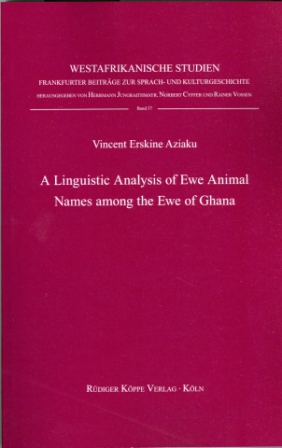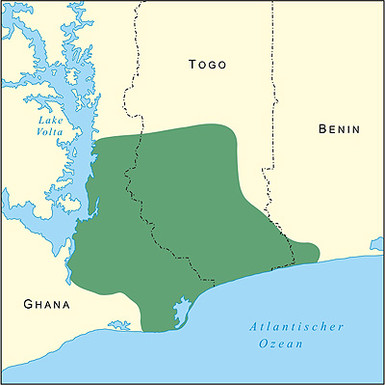

A Linguistic Study of Ewe Animal Names among the Ewe of Ghana
Author: Vincent Erskine Aziaku. Series edited by: Herrmann Jungraithmayr, Norbert Cyffer, Rainer Voßen.
Series: WeStu Westafrikanische Studien Volume 37
201618 pp. Roman, 224 pp.
1 colour figure, 6 b/w figures, 2 tree diagrams, 5 tables, numerous charts, appendix: 524 Ewe Animal Names with their Scientific (Latin), English Common Names and Ewe Indicatives
Text language(s): English
Format: 160 x 240 mm
470 g
Paperback
€ 49.80
Buy 'A Linguistic Study of Ewe Animal Names among the Ewe of Ghana' as a downloadable PDF document directly from our online shop »
Order 'A Linguistic Study of Ewe Animal Names among the Ewe of Ghana' as print edition »
This study is a descriptive analysis of animal names among the Ewe of Ghana. The Ewe people of Ghana predominantly occupy the Volta Region located along the southern half of the eastern border of Ghana, which it shares with the Republic of Togo. The region encompasses most of the vegetation zones found in the country and is ethnically and linguistically diverse (Ewe, Guan, Akan and Gurma). The predominant ethnic group is Ewe (68.5%). The Ewe language is a member of the Kwa language family, which constitutes a sub-unit of the Niger-Congo phylum.
Scholars have observed that animal names have been an attractive field of study in African linguistics but seem to be rather neglected by linguists. Therefore the present study focuses on the Ewe ethnozoological ranking of animals, the morphological structures of Ewe animal names, a kind of etymology of animal names, and the sociolinguistic factors that influence the naming process.
Scientific studies show that animals have been categorised into groups, and this taxonomic grouping of the species among folks needs to be established; this then provides a platform for comparison between the scientific classification and the folk classification. The morphological classification of animal names provides the basic morphological concepts that the formation of names is based on. The formation of animal names among the Ewe conforms to the various word formation processes including compounding, reduplication, and clipping.
The present study describes the various nominalisation processes that were explored in the formation of animal names. Hence, it offers new perspectives of names and naming practices among the Ewe of Ghana and so provides the possibility of researchers to give attention to the structure of animal names.
Under these links you will find a sketch grammar, a textbook of Ewe and an account of Ghananian family history, as well as further studies of onomastics in Africa:
Accompanying material:
- Expérience végétale bolia (C.35b, République Démocratique du Congo)
(ISBN 978-3-89645-037-1 ) - La dynamique des noms de personnes chez les Ding de la République démocratique du Congo (1885–1960)
(ISBN 978-3-89645-896-4 ) - Les noms de naissance
(ISBN 978-3-89645-605-2 ) - Linguistic Salvage – Isubu and Wovea (Bantu A231)
(ISBN 978-3-89645-770-7 )
Cross-reference:
- African Sociolinguistic and Sociocultural Studies
(ISBN 978-3-89645-721-9 ) - Basic Ewe for Foreign Students
(ISBN 978-3-89645-584-0 ) - Die Konstruktion von Ethnizität
(ISBN 978-3-89645-207-8 ) - Kurzgrammatik des Ewe
(ISBN 978-3-927620-19-3 ) - Verwandtschaft und Mittelklasse in Ghana
(ISBN 978-3-89645-844-5 )
| « back | Print version | [top] |
 Books
Books Audio
Audio Biographies
Biographies Series
Series Festschrifts
Festschrifts Journals
Journals